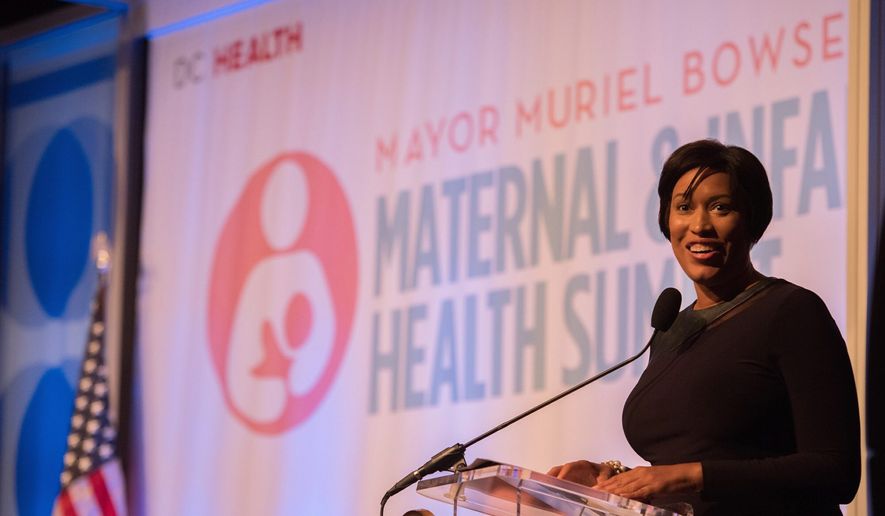A D.C. Superior Court judge dealt what could be a mortal blow to a lawsuit against Mayor Muriel Bowser’s advisory panel on the search for a new school chancellor.
On Friday, D.C. Superior Court Judge Anthony C. Epstein declined to award a preliminary injunction, which would have stopped the search while a trial proceeded, which is key because the advisory panel is scheduled to meet Oct. 22 to recommend a candidate and the closest trial date available is Nov. 16.
Judge Epstein said the plaintiffs had failed to establish a “causal connection” between the mayor appointing members to the panel who are not students, parents, teachers or teachers union members, and those groups being disenfranchised. He noted they could not prove the mayor would choose a different chancellor because of the mixed membership, “only that it might be different.”
Plaintiffs attorney Greg Smith told The Washington Times he was “surprised” by the judge’s decision. When speaking with the two lawyers representing the D.C. Attorney General’s office, Mr. Smith said he likely didn’t want to proceed to the trial with Judge Epstein, who made it clear he wasn’t likely to change his mind about the panel.
Mr. Smith represents pro bono five of the six parents, teachers and students who filed the August suit. The lawsuit says Miss Bowser has not appointed enough parents, teachers and students to the board, which will advise the mayor in the chancellor selection process, in accordance with D.C. law.
The panel was formed this summer to advise on the hunt for a replacement for ousted Chancellor Antwan Wilson, who resigned after he broke his own policy against discretionary transfers to move his daughter into the coveted Wilson High School and skip the public schools’ waitlist.
Miss Bowser announced this week that consultant Paul Kihn would replace former deputy mayor of education Jennifer Niles, who was forced to resign for secretly helping Mr. Wilson.
D.C. Code 38-174(b) says the mayor “shall … establish a review panel of teachers, including representatives of the Washington Teachers Union, parents, and students (“panel”) to aid the mayor in his or her selection of chancellor.”
Smith argued for more than 15 minutes Friday that the word “of” in the measure means the mayor must appoint only parents, teachers, students and union representatives to the board. “If I ask for a glass ’of’ water, I don’t expect something else,” he said.
The mayor has appointed seven people to the 19-member advisory panel who fall into some other category, such as a university president or charter school official. The panel originally had 14 members, with one student and one teacher.
Two weeks ago, Miss Bowser added two more teachers and students and one more parent after a previous judge chided her lawyers for arguing that the plural use of “students” in the law didn’t mean that more than one needed to be added to the panel.
On Friday, Judge Epstein asked “how does that help the other members of the panel” if the court ordered the mayor to remove the seven appointees who are outliers.
“Because they make a recommendation and there is a political price to be paid if that’s not followed,” Mr. Smith answered.
The statute does not require the mayor to adhere to any recommendation from the advisory board when selecting a new chancellor, but it does require her to “consider” their pick, as well as “give great weight to any recommendation of the Washington Teachers Union.” The law was written to preserve parent, teacher, and student input on chancellor selection after control over the city’s education system was handed to the executive office a decade ago.
Judge Epstein disagreed that that group’s voice was “diluted” if others joined the board because the panel’s recommendations are non-binding and the mayor is free to consult with whomever she wants during the selection process.
The judge added that a bigger panel provided an “opportunity” to “talk to the folks with the mayor’s ear” and try to “influence” their recommendations to the mayor.
Lead plaintiff Valerie Jablow told The Washington Times she wasn’t sure if she wanted to seek an appeal for another shot at an injunction.
Several education advocates wrote amicus briefs supporting the case over the past month, including Mary Levy, an influential education researcher, Suzanne Wells, founder of the Capitol Hill Public Schools Parents Association, and the Washington Teachers Union.
Mr. Smith said he would decide whether to appeal before the Oct. 14 deadline to file a motion to dismiss the case.
The Attorney General’s office did not immediately respond to requests for comment.
• Julia Airey can be reached at jairey@washingtontimes.com.




Please read our comment policy before commenting.